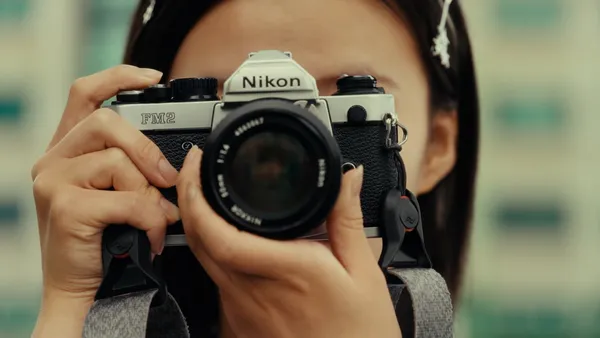Eye For Film >> Movies >> Summer's Camera (2024) Film Review
Summer's Camera
Reviewed by: Jennie Kermode

Coming to terms with the past and embracing the future are intertwined in this thoughtful coming-of-age tale from South Korea’s Divine Sung. Premièred at BFI Flare 2025, it follows teenager Summer a year out from the loss of her father, when she still hasn’t really talk with her mother about it; when she still, sometimes, goes to stand on the road at the place where it happened, as if waiting for a car to hit her too. She was always close to him and since his death she has carried the old film camera that he gave her with all all the time, hesitating to use the last four shots on the roll. It’s catching sight of a Yeon-woo that changes that – that leads to an impulsive snap of the shutter, and begins to change everything.
Yeon-woo, tall and androgynous, relaxed in her body, possessed of a careless sort of smile, is the school’s star football player. She’s flattered by being photographed and takes a reciprocal interest, which gradually develops into a relationship. It’s a sweet sort of thing. They’re very young. Neither has ever kissed before. Holding hands is a thrill. Summer is giddy with excitement, summoning up her courage to come out to best friend Minjeong, who finds herself in an awkward third wheel space, pleased for her bestie and keen to befriend the popular Yeon-woo, but jealous over lost one-to-one time.

At the same time as she’s adjusting to this, Summer discovers, from developing the film in the camera, that her father also had a same sex relationship. This is inevitably more complex, in light of her parents’ marriage and her own emotional investment in that, but she feels driven to track down Maru, her father’s lover, who runs an elite local hairdressing salon. At first he wants nothing to do with her, but gradually he turns into a sort of mentor, the older guide that many a young queer person needs. Wrestling with his own grief, he begins to share memories with her that lead to the construction of the dead Han Jihoon in the mind of the viewer and his reconstruction in the minds of those who loved him.
If you ever need time to slow down, Minjeong, fresh out of a physics lesson, advises Summer, try running really fast. Summer laughs. It would be difficult to run at the speed of light. But light stands still in the photographs. Meanwhile, Sung’s own camera plays tricks, placing objects too close in the foreground so that parts of an image are out of focus, like an incomplete memory. She finds a perfect canvas in her heroine’s smooth, doll-like face, with its little smudge of peach-coloured lipstick, a shade only teenagers wear, locating the girl in the course of her own life. There are quick eyes in that face, putting all the emphasis on the act of looking. Summer is taking in a lot as the world changes around her, but will she be ready to take action when the time comes?
The highly conscious framing which shapes the story can’t detract from the freshness of the performances. Instead they work in concert, the formal and the organic, echoing Han Jihoon’s landscape photography. The multi-layered, sensitively developed story captures shades of adolescence that we don’t often see. Smooth surfaces conceal unexpected depths. Intimate and particular, Summer’s Camera is a gem.
Reviewed on: 28 Mar 2025















